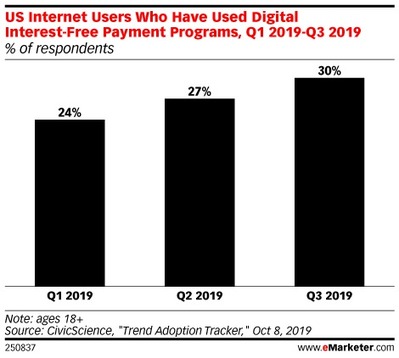More Consumers Are Turning to Digital Payment Plans, Even for Low-Cost Items – eMarketer Trends, Forecasts & Statistics
According to data from CivicScience, adoption of digital interest-free payment programs—like Affirm, Afterpay and Sezzle—has grown gradually in the past year, from 24% in Q1 2019 to 30% in Q3 2019 among US internet users.Consumers may turn to these alternative credit solutions to purchase a luxury handbag or new sofa, but not everyone is using digital installment plans solely for big-ticket items.“That's a common misperception,” said Paul Paradis, co-founder and chief revenue officer of Sezzle, an ecommerce payment platform. “Our average order value is right around $80, which is a lot lower than most people think it is.”









